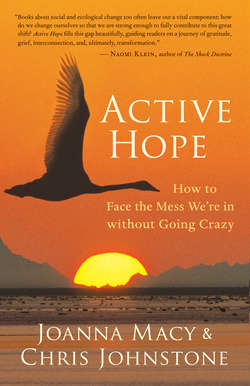Читать книгу Active Hope - Joanna Macy - Страница 36
На сайте Литреса книга снята с продажи.
GRATITUDE AS AN ANTIDOTE TO CONSUMERISM
ОглавлениеWhile gratitude leads to increased happiness and life satisfaction, materialism — placing a higher value on material possessions than on meaningful relationships — has the opposite effect. In reviewing the research, psychologists Emily Polak and Michael McCullough conclude: “The pursuit of wealth and possessions as an end unto itself is associated with lower levels of well-being, lower life satisfaction and happiness, more symptoms of depression and anxiety, more physical problems such as headaches, and a variety of mental disorders.”6
Affluenza is a term used to describe the emotional distress that arises from a preoccupation with possessions and appearance. Psychologist Oliver James views it as a form of psychological virus that infects our thinking and is transmitted by television, glossy magazines, and advertisements. The toxic belief at the core of this condition is that happiness is based on how we look and what we have. If we compare our appearance or wealth to that of the models and millionaires on prime-time television, it is easy to feel we don’t measure up so well. James comments, “Since programmes are saturated with exceptionally attractive people living abnormally opulent lives, expectations of what is ‘normal’ are raised.”7
When women were asked to rate their self-esteem and satisfaction with their appearance, measures for both fell after the women looked at photos of models in women’s magazines.8 How we feel depends so much on what we compare ourselves to, and an increase in eating disorders is one of the consequences of having thin models as a reference group. In 1995, the year television was introduced to Fiji, there were no recorded cases of bulimia on the island. Yet within three years, 11 percent of young Fijian women were found to be suffering from this eating disorder.9
Gratitude is about delighting in and feeling satisfied with what you’re already experiencing. The advertising industry aims to undermine this by convincing you that you’re missing something. On a website for marketing professionals, the advertiser’s Law of Dissatisfaction is described like this:
The job of advertisers is to create dissatisfaction in its audience. If people are happy with how they look, they are not going to buy cosmetics or diet books…. If people are happy with who they are, where they are in life, and what they got, they just aren’t customer potential — that is, unless you make them unhappy.
Most cosmetic advertisements feature beautiful women, igniting the promise that you too can look like a drop-dead glorious model if only you use the product. This approach is based on showing an ideal that the audience will undoubtedly be unable to stack up against. The audience, after seeing what they could look like, is no longer happy with what they do look like, and they are now motivated to buy into the promise of change.10
Each year, more than four hundred billion dollars are spent on advertising that pushes the message “buy this, and your life will improve.” Yet even though people in materially rich countries buy many more things than they did fifty years ago, surveys show they are less happy (see Box 3.1).11 Depression has reached epidemic proportions, with one in two people in the Western world likely to suffer a significant episode at some point in their lives.12 The consumer lifestyle isn’t just wrecking our world; it is also making us miserable. Can gratitude play a role in our rehabilitation?
Box 3.1. Ponder Point
More resources have been consumed in the last fifty years than in all preceding human history.13 Yet we’re not any happier, and depression has reached epidemic proportions.
In looking at what drives materialism, researcher Tim Kasser identifies two main factors: feelings of insecurity and exposure to social models expressing materialistic values.14 Gratitude, by promoting feelings of trust, helps counter insecurity. By making us more likely to return favors and help others, it also encourages us to act in ways that strengthen the networks of support around us. As Polak and McCullough point out, “Gratitude alerts us that there are people out there with our well-being in mind and it motivates us to deepen our own reservoirs of social capital through reciprocation.”15
Gratitude and materialism offer different stories about what we need in order to feel secure. With materialism, security is based on having the right things: we know what these right things are by keeping an eye on our neighbors and on current fashions. Insecurity grows when we feel we’re falling behind, and pressure builds to “keep up with the Joneses” in a way that further drives consumption.
Gratitude pulls us out of this rat race. It shifts our focus from what’s missing to what’s there. If we were to design a cultural therapy that protected us from depression and, at the same time, helped reduce consumerism, it would surely include cultivating our ability to experience gratitude. Training ourselves in the skill of gratitude is part of the Great Turning.
